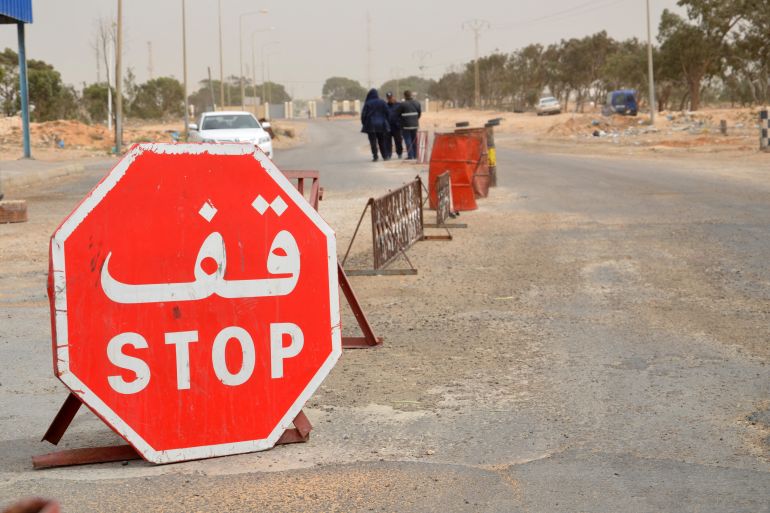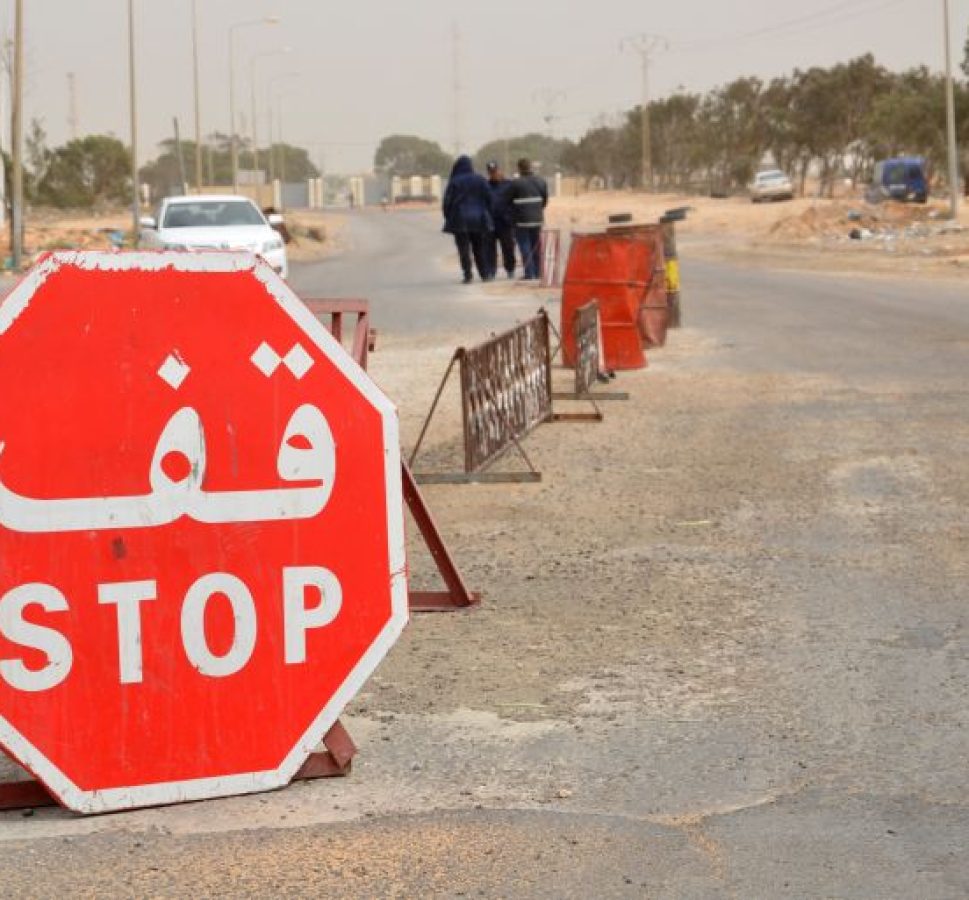
The people of Ben Guerdane survived off the Ras Jadir border crossing. It closure hurt them, badly.
Nothing much is moving in Ben Guardane, Mohammed says.
The money-changing kiosks sit silent and the ad hoc markets by the banks of the saltwater inlets that line the route into the Tunisian border town are empty, they used to sell goods imported into Libya and snuck into Tunisia.
Nothing is moving, Mohammed repeats.
The nearby Tunisian border crossing with Libya remains closed, as it has been since late March violence on the Libyan side of the border. The official reason for closure is technical renovations.
Fighting had broken out between forces loyal to Libya’s Amazigh, who had largely controlled the crossing since the 2011 revolution, and forces from Tripoli’s Ministry of Interior, shuttering the crossing by March 20. It is not unusual, clashes between militias, and even civil war, have become almost normal for most Libyans since the revolution of 2011, and the border area is wild.
Ben Guardane is struggling, Mohammed says. One way or another, almost everyone in the town relies on trade – legitimate and illegitimate – from Libya.

On Thursday, officials from Libya and Tunisia are slated to visit the border crossing at Ras Jedir and mark its reopening after a compromise between the warring factions, brokered by the Libyan Ministry of Defence. Many in Ben Guardane hope it will lead to a resumption of trade, but few believe it.
The traders and the smugglers
Ben Guerdane relies on the border. From the days when local tribes escorted trans-Saharan caravans through the territory, to the establishment of the frontier in 1910, legal and illegal trade has been the border town’s lifeblood.
Over the intervening years, trade, traders and smugglers became entrenched in the area’s fabric, until recently given free rein by both coloniser and ensuing governments in return for securing the fractious border region, all at no cost to the state.
That changed from about 2014 onwards, as ISIL fighters, fuelled in no small part by willing recruits from Tunisia, took swaths of Libya, including Sirte, the birthplace of Muammar Gaddafi.
In 2016, the group attempted to invade Tunisia, and ISIL fighters stormed Ben Guerdane, only to be repelled by Tunisian security forces who stayed on beyond the fighting, essentially ending much, though not all, of the town’s autonomy.

Security on the Tunisian side is now handled largely by the state while the Libyan side has been managed by forces from the Amazigh tribespeople of the coastal town of Zuwara, whose relationship with the internationally recognised government in Tripoli is, at best, loose.
Controlling Ras Jedir would be significant for any of the factions or armed groups competing for power in Libya.
When it was open, Ras Jedir had miles of trucks passing through each day, carrying everything from commercial goods to industrial cargo manufactured in distant markets for Tunisian clients, delivered by ship to Libyan ports as near as Tripoli or as far afield as Misrata to avoid heavy Tunisian import duties, before being trucked through Ras Jedir into Tunisia.
Around them scurried the myriad numbers of flatbed trucks, distinctive for their heightened suspension, taking goods as diverse as mobile phone covers to Hello Kitty rucksacks to markets throughout Tunisia.
Getting in on the action
Placing an actual value on the total goods passing between Libya and Tunisia at Ras Jedir is impossible.
However, Libyan Minister of the Interior Imad Trabelsi was probably not exaggerating greatly in March when he labelled Ras Jedir “one of the largest smuggling hubs in the world”, estimating the value of goods passing illegally there at “$100m a week”.

“On a bad day, anywhere up to 300 trucks, 5,000 cars and 10,000 people can cross the border at Ras Jedir. That’s on a bad day. In terms of taxation and bribes, we’re talking about very serious money,” Hamza Meddeb, a research fellow at the Carnegie Middle East Institute who has written extensively on the border, told Al Jazeera.
That the Tripoli government would try and wrest control of the valuable crossing was almost inevitable.
However, while it may have been the clashes between the Zuwara fighters and forces loyal to the Ministry of Interior that triggered its latest closure, the reasons for it remaining closed for so long are likely numerous.
“It could be almost anything,” Meddeb continued. “It could be due to Abdul Hamid Dbeibah’s [interim Tripoli prime minister, pending long-promised elections] dispute with the Central Bank, which really doesn’t trust him and has left him short of funding.
“It could be the Libyan funds still being held in Tunisian banks since the revolution, which they’re not allowing them to access without proof of where it came from. The reasons could also lie further afield. Both Tripoli and Tunis have international allies that are rivals, such as the UAE and Turkey.
“Literally, it could be anything,” he said.
Lawmakers in Libya’s capital, locked in a battle for legitimacy with the rival eastern parliament in Benghazi, likely feel that controlling a valuable national asset such as Ras Jedir would bolster their ambitions for international credibility.
For the Amazigh, suppressed brutally under Gaddafi, control of the crossing and other assets, such as the oil platform at Mellitah, is, according to analysts, about safeguarding their future and that of their people as it is political influence.
After decades of repression, the Amazigh had been among the first Libyans to pick up arms and join the NATO-led coalition against Gadaffi in 2011. Subsequent years have brought them little but further uncertainty.
However, running through it all is a flow of heavily subsidised Libyan fuel and the illicit networks that shepherd it beyond the North African country’s borders.
Despite being oil-rich, Libya still imports much of its refined fuel, which is then sold to citizens at a heavily discounted rate.

According to a yearlong investigation by Bloomberg, anywhere up to 40 percent of fuel imported to Libya is resold to other countries, such as Europe (via Malta), Turkey, Sudan, and Tunisia, through Ras Jedir.
“Smuggling has become part of the Libyan economy, especially in borderlands,” Jalel Harchaoui of the Royal United Service Institute said. “Irregular losses of fuel over the border aren’t even reported or estimated by National Oil Company’s [NOC].
“The odds are, if you’re at the top of the NOC, people with links to smuggling helped put you there,” he said.
“The recent attempt by the Dbeiba government and its Ministry of Interior to seize the border crossing was at best weak and clumsy,” he said.
“It’s taken weeks since for officials at the Ministry of Defence to broker a truce between the Amazigh and the Ministry of Interior. Defence officials … just want stability. As for Tunisia, they just want to see their border back and the flow of goods, including smuggled fuel, resume.”
For Mohammed, in his early 30s and reliant on the irregular work the border brings, little of this matters.
He’s just waiting for his town to return to life.






